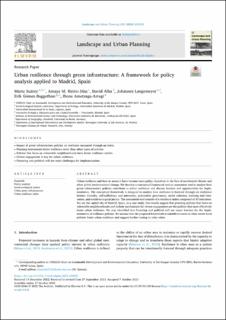| dc.contributor.author | Suárez, Marta | |
| dc.contributor.author | Rieiro-Díaz, Amaya M. | |
| dc.contributor.author | Alba, David | |
| dc.contributor.author | Langemeyer, Johannes | |
| dc.contributor.author | Gomez-Baggethun, Erik | |
| dc.contributor.author | Ametzaga-Arregi, Ibone | |
| dc.coverage.spatial | Madrid, Spain | en_US |
| dc.date.accessioned | 2024-01-12T13:45:00Z | |
| dc.date.available | 2024-01-12T13:45:00Z | |
| dc.date.created | 2024-01-11T10:25:35Z | |
| dc.date.issued | 2023 | |
| dc.identifier.issn | 0169-2046 | |
| dc.identifier.uri | https://hdl.handle.net/11250/3111342 | |
| dc.description.abstract | Urban resilience and how to assess it have become main policy objectives in the face of accelerated climate and other global environmental change. We develop a conceptual framework and an assessment tool to analyse how green infrastructure policies contribute to urban resilience and discuss barriers and opportunities for implementation. The conceptual framework is designed to analyse how resilience is fostered through six resilience factors: diversity, self-sufficiency and autonomy, polycentric governance, social cohesion, learning and innovation, and social-ecological justice. The assessment tool consists of a resilience index composed of 30 indicators. We use the capital city of Madrid, Spain, as a case study. Our results suggest that planning policies that focus on vulnerable neighbourhoods and include mechanisms for citizen engagement are the policies that most effectively foster urban resilience. We also identified that financing and political will are major barriers for the implementation of resilience policies. We assume that the proposed framework is suitable to assess to what extent local policies foster urban resilience and suggest further testing in other cities. Policy analysis Social-ecological justice Urban green infrastructure Urban resilience index | en_US |
| dc.language.iso | eng | en_US |
| dc.rights | Attribution-NonCommercial-NoDerivatives 4.0 Internasjonal | * |
| dc.rights.uri | http://creativecommons.org/licenses/by-nc-nd/4.0/deed.no | * |
| dc.subject | Policy analysis | en_US |
| dc.subject | Social-ecological justice | en_US |
| dc.subject | Urban green infrastructure | en_US |
| dc.subject | Urban resilience index | en_US |
| dc.title | Urban resilience through green infrastructure: A framework for policy analysis applied to Madrid, Spain | en_US |
| dc.title.alternative | Urban resilience through green infrastructure: A framework for policy analysis applied to Madrid, Spain | en_US |
| dc.type | Peer reviewed | en_US |
| dc.type | Journal article | en_US |
| dc.description.version | publishedVersion | en_US |
| dc.rights.holder | © 2023 The Authors | en_US |
| dc.subject.nsi | VDP::Arkitektur og design: 140 | en_US |
| dc.subject.nsi | VDP::Architecture and design: 140 | en_US |
| dc.source.volume | 241 | en_US |
| dc.source.journal | Landscape and Urban Planning | en_US |
| dc.identifier.doi | 10.1016/j.landurbplan.2023.104923 | |
| dc.identifier.cristin | 2224383 | |
| dc.relation.project | Andre: Madrid City Council | en_US |
| dc.relation.project | Andre: Asociacion Ecología y Educacion para una Ciudad Sostenible | en_US |
| dc.source.articlenumber | 104923 | en_US |
| cristin.ispublished | true | |
| cristin.fulltext | original | |
| cristin.qualitycode | 2 | |

